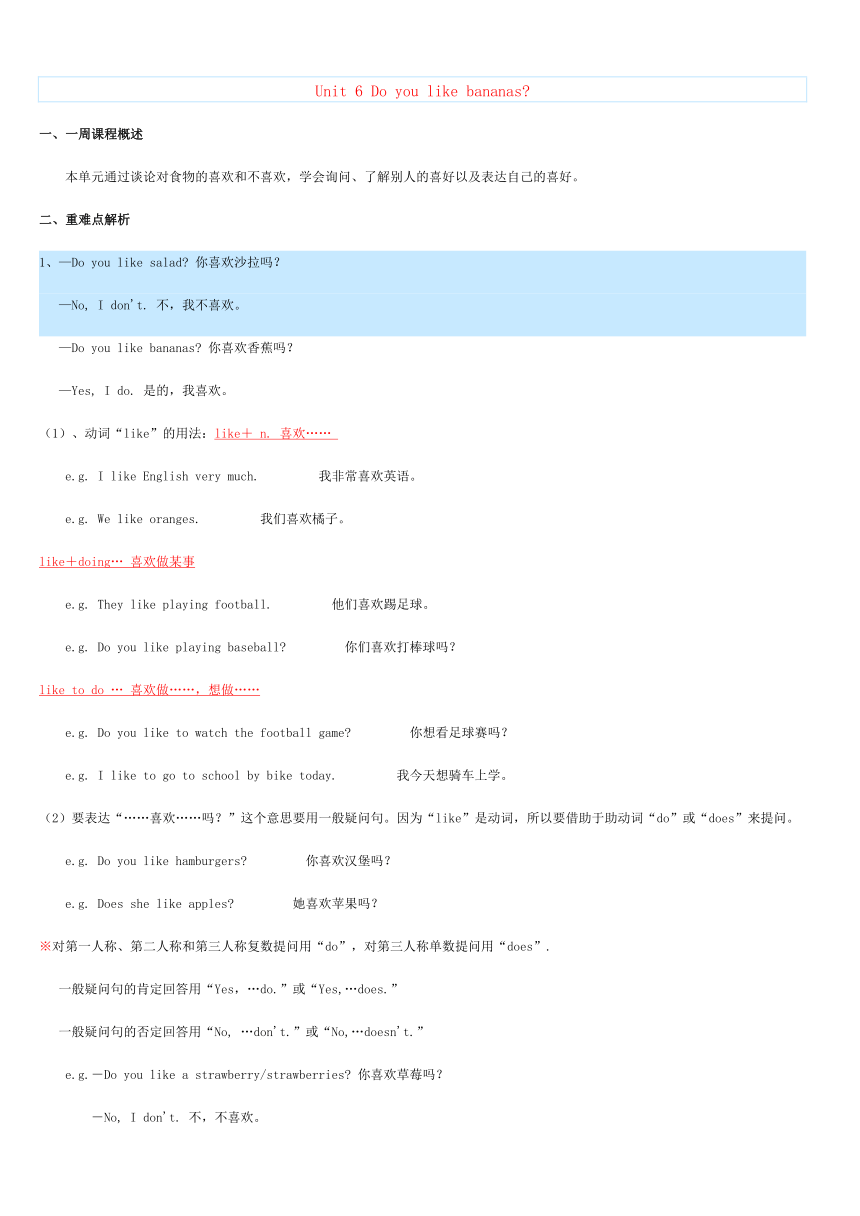Unit 6 Do you like bananas?教案
文档属性
| 名称 | Unit 6 Do you like bananas?教案 |

|
|
| 格式 | zip | ||
| 文件大小 | 174.5KB | ||
| 资源类型 | 教案 | ||
| 版本资源 | 人教新目标(Go for it)版 | ||
| 科目 | 英语 | ||
| 更新时间 | 2017-09-08 00:00:00 | ||
图片预览

文档简介
Unit
6
Do
you
like
bananas
一、一周课程概述
本单元通过谈论对食物的喜欢和不喜欢,学会询问、了解别人的喜好以及表达自己的喜好。
二、重难点解析
1、—Do
you
like
salad
你喜欢沙拉吗?
—No,
I
don't.
不,我不喜欢。
—Do
you
like
bananas
你喜欢香蕉吗?
—Yes,
I
do.
是的,我喜欢。
(1)、动词“like”的用法:like+
n.
喜欢……
e.g.
I
like
English
very
much.
我非常喜欢英语。
e.g.
We
like
oranges.
我们喜欢橘子。
like+doing…
喜欢做某事
e.g.
They
like
playing
football.
他们喜欢踢足球。
e.g.
Do
you
like
playing
baseball
你们喜欢打棒球吗?
like
to
do
…
喜欢做……,想做……
e.g.
Do
you
like
to
watch
the
football
game
你想看足球赛吗?
e.g.
I
like
to
go
to
school
by
bike
today.
我今天想骑车上学。
(2)要表达“……喜欢……吗?”这个意思要用一般疑问句。因为“like”是动词,所以要借助于助动词“do”或“does”来提问。
e.g.
Do
you
like
hamburgers
你喜欢汉堡吗?
e.g.
Does
she
like
apples
她喜欢苹果吗?
※对第一人称、第二人称和第三人称复数提问用“do”,对第三人称单数提问用“does”.
一般疑问句的肯定回答用“Yes,…do.”或“Yes,…does.”
一般疑问句的否定回答用“No,
…don't.”或“No,…doesn't.”
e.g.-Do
you
like
a
strawberry/strawberries
你喜欢草莓吗?
-No,
I
don't.
不,不喜欢。
-Does
your
sister
like
ice
cream
你妹妹喜欢冰淇淋吗?
-Yes,
she
does.
She
likes
it
very
much.
是的,她非常喜欢。
(3)要表达“…不喜欢…”,就要用否定句。
“……don't
like……”或“……doesn't
like……”
e.g.
I
don't
like
French
fries.
我不喜欢炸薯条。
e.g.
My
brother
doesn't
like
carrots.
我弟弟不喜欢胡萝卜。
※在表示“喜欢”或“不喜欢”的时候,还可以加上一些表示程度的副词。
e.g.
I
like
chicken
very
much.
我非常喜欢鸡肉。
e.g.
She
likes
fruit
a
little.
她有一点喜欢水果。
e.g.
My
mother
doesn't
like
apples
at
all.
我妈妈一点也不喜欢苹果。
2、breakfast,
lunch,
supper,
dinner的用法
breakfast
早餐
lunch
午餐
supper
晚餐
dinner
正餐、晚餐(比较正式的那一餐)
表示“吃早餐”、“吃午餐”、“吃晚餐”可用动词“have”,中间不加“the”.但可以用形容词性的物主代词:
e.g.
Do
you
have
your
breakfast
你吃了早餐吗?
e.g.
I
have
lunch
at
home.
我在家吃午饭。
要表示“吃……当早餐”的意思时,可用“have…for
breakfast”句型。
e.g.
I
have
hamburgers
and
milk
for
breakfast.
I
have
rice
and
vegetables
for
lunch.
我早餐吃汉堡、喝牛奶,午餐吃米饭和蔬菜。
3、lots
of的用法 lots
of
许多的,大量的=a
lot
of,可用来修饰可数名词的复数形式,也可修饰不可数名词。
e.g.
We
have
lots
of
/
a
lot
of
new
books.
我们有许多新书。
e.g.
They
eat
lots
of
healthy
food.
他们吃了大量的健康食品。
6
Do
you
like
bananas
一、一周课程概述
本单元通过谈论对食物的喜欢和不喜欢,学会询问、了解别人的喜好以及表达自己的喜好。
二、重难点解析
1、—Do
you
like
salad
你喜欢沙拉吗?
—No,
I
don't.
不,我不喜欢。
—Do
you
like
bananas
你喜欢香蕉吗?
—Yes,
I
do.
是的,我喜欢。
(1)、动词“like”的用法:like+
n.
喜欢……
e.g.
I
like
English
very
much.
我非常喜欢英语。
e.g.
We
like
oranges.
我们喜欢橘子。
like+doing…
喜欢做某事
e.g.
They
like
playing
football.
他们喜欢踢足球。
e.g.
Do
you
like
playing
baseball
你们喜欢打棒球吗?
like
to
do
…
喜欢做……,想做……
e.g.
Do
you
like
to
watch
the
football
game
你想看足球赛吗?
e.g.
I
like
to
go
to
school
by
bike
today.
我今天想骑车上学。
(2)要表达“……喜欢……吗?”这个意思要用一般疑问句。因为“like”是动词,所以要借助于助动词“do”或“does”来提问。
e.g.
Do
you
like
hamburgers
你喜欢汉堡吗?
e.g.
Does
she
like
apples
她喜欢苹果吗?
※对第一人称、第二人称和第三人称复数提问用“do”,对第三人称单数提问用“does”.
一般疑问句的肯定回答用“Yes,…do.”或“Yes,…does.”
一般疑问句的否定回答用“No,
…don't.”或“No,…doesn't.”
e.g.-Do
you
like
a
strawberry/strawberries
你喜欢草莓吗?
-No,
I
don't.
不,不喜欢。
-Does
your
sister
like
ice
cream
你妹妹喜欢冰淇淋吗?
-Yes,
she
does.
She
likes
it
very
much.
是的,她非常喜欢。
(3)要表达“…不喜欢…”,就要用否定句。
“……don't
like……”或“……doesn't
like……”
e.g.
I
don't
like
French
fries.
我不喜欢炸薯条。
e.g.
My
brother
doesn't
like
carrots.
我弟弟不喜欢胡萝卜。
※在表示“喜欢”或“不喜欢”的时候,还可以加上一些表示程度的副词。
e.g.
I
like
chicken
very
much.
我非常喜欢鸡肉。
e.g.
She
likes
fruit
a
little.
她有一点喜欢水果。
e.g.
My
mother
doesn't
like
apples
at
all.
我妈妈一点也不喜欢苹果。
2、breakfast,
lunch,
supper,
dinner的用法
breakfast
早餐
lunch
午餐
supper
晚餐
dinner
正餐、晚餐(比较正式的那一餐)
表示“吃早餐”、“吃午餐”、“吃晚餐”可用动词“have”,中间不加“the”.但可以用形容词性的物主代词:
e.g.
Do
you
have
your
breakfast
你吃了早餐吗?
e.g.
I
have
lunch
at
home.
我在家吃午饭。
要表示“吃……当早餐”的意思时,可用“have…for
breakfast”句型。
e.g.
I
have
hamburgers
and
milk
for
breakfast.
I
have
rice
and
vegetables
for
lunch.
我早餐吃汉堡、喝牛奶,午餐吃米饭和蔬菜。
3、lots
of的用法 lots
of
许多的,大量的=a
lot
of,可用来修饰可数名词的复数形式,也可修饰不可数名词。
e.g.
We
have
lots
of
/
a
lot
of
new
books.
我们有许多新书。
e.g.
They
eat
lots
of
healthy
food.
他们吃了大量的健康食品。
同课章节目录
- starters 预备篇(2012秋审查)
- Unit 1 Good morning !
- Unit 2 What’s this in English?
- Unit 3 What color is it ?
- Unit 1 My name's Gina.
- Section A
- Section B
- Unit 2 This is my sister.
- Section A
- Section B
- Unit 3 Is this your pencil?
- Section A
- Section B
- Unit 4 Where's my schoolbag?
- Section A
- Section B
- Unit 5 Do you have a soccer ball?
- Section A
- Section B
- Unit 6 Do you like bananas?
- Section A
- Section B
- Unit 7 How much are these socks?
- Section A
- Section B
- Unit 8 When is your birthday?
- Section A
- Section B
- Unit 9 My favorite subject is science.
- Section A
- Section B
